Authoritative parenting benefits
The authoritative parenting style: An evidence-based guide
© 2010 – 2017 Gwen Dewar, Ph.D., all rights reserved
What is authoritative parenting?
The authoritative parenting style is an approach to child-rearing that combines warmth, sensitivity, and the setting of limits. Parents use positive reinforcement and reasoning to guide children. They avoid resorting to threats or punishments.
This approach is common in educated, middle class families, and linked with superior child outcomes throughout the world.
Kids raised by authoritative parents are more likely to become independent, self-reliant, socially accepted, academically successful, and well-behaved. They are also less likely to report depression and anxiety, and less likely to engage in antisocial behavior like delinquency and drug use.
And research suggests that having at least one authoritative parent can make a big difference (Fletcher et al 1999).
But what exactly sets the authoritative parenting style apart? How is it different from authoritarian parenting? How do experts decide if you’re an authoritative parent, or practicing some other parenting style? And why, exactly, do researchers think authoritativeness breeds success?
Here is an overview.
The authoritative parenting style: The original definition
The authoritative parenting style was first defined by Diane Baumrind, who proposed a new system for classifying parents. Her idea was to focus on the way parents attempted to control their kids (Baumrind 1966).
She recognized three major approaches to parental control:
- Permissive parents are reluctant to impose rules and standards, preferring to let their kids regulate themselves.
- Authoritarian parents demand a sort of blind obedience from their children.
- Authoritative parents take a different, more moderate approach that emphasizes setting high standards, being nurturing and responsive, and showing respect for children as independent, rational beings. The authoritative parent expects maturity and cooperation, and offers children lots of emotional support.
So what’s the main difference between authoritative parenting from permissive parenting?
Limit-setting.
Like permissive parents, authoritative parents are responsive, nurturing, and involved. But unlike permissive parents, authoritative parents don’t let their kids get away with bad behavior. Authoritative parents take a firm stand, expecting their kids to behave responsibly.
And what’s the difference between authoritative and authoritarian parenting?
It’s all about the exercise of power. Think of the authoritarian parent as a drill sergeant. Do it now, or else! The drill sergeant tries to get his way through threats and coercion.
By contrast, the authoritative parent aims to inspire cooperation by fostering positive feelings, and teaching kids the reasons for the rules.
Authoritative parents communicate lots of warmth to their kids. They avoid using harsh or arbitrary punishments. They are less likely to shame their kids, or attempt to control kids by withdrawing love.
And when their children make mistakes or misbehave, they talk with them about it.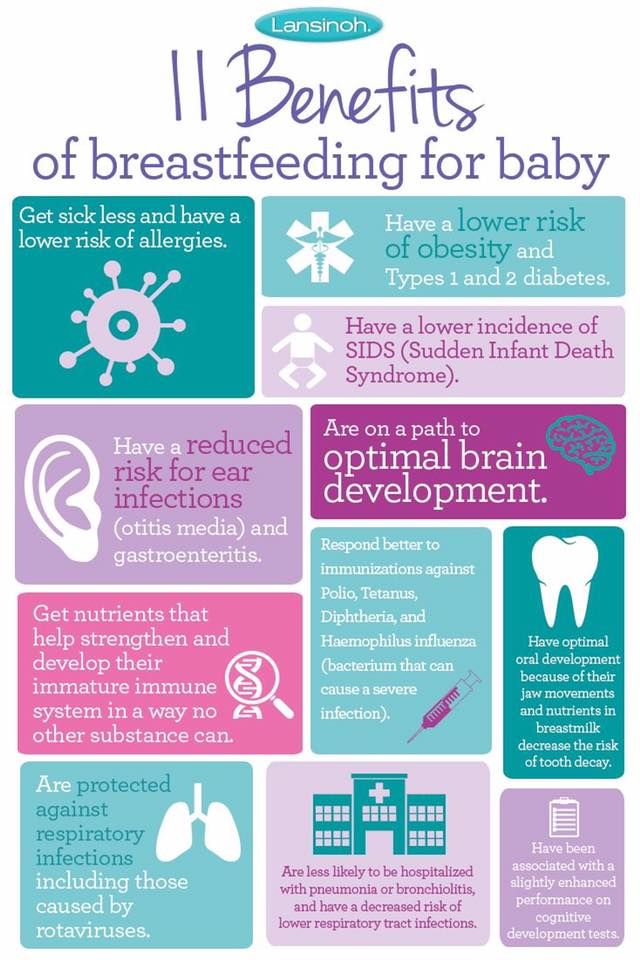 They listen to their children’s concerns, and take them into account. They help kids figure out what went wrong, and explain the consequences of good and bad behavior.
They listen to their children’s concerns, and take them into account. They help kids figure out what went wrong, and explain the consequences of good and bad behavior.
So while they have similar-looking names, there is a big difference between authoritative and authoritarian parenting.
Authoritative parents aren’t just trying to enforce compliance. They recognize and encourage a child’s sense of autonomy. They want kids to develop self-discipline, maturity, and a respect for others. And they approach these goals by offering concrete advice and emotional support.
Summed up, some researchers have described it this way: Authoritative parents are highly demanding (like authoritarian parents), but they are also very responsive to their children’s needs (Maccoby and Martin 1983).
That’s the classic definition of the authoritative parenting style, and, using this definition, researchers have identified the authoritative parents throughout the world.
But not every authoritative parent runs his or her family the same way.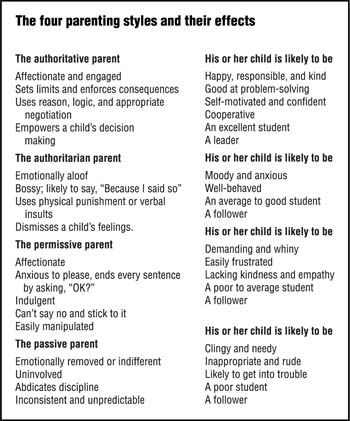 There is some important variation, particularly when it comes to how much of a “vote” children get during family decision-making.
There is some important variation, particularly when it comes to how much of a “vote” children get during family decision-making.
It’s one thing to read a definition, and another to put it into practice. How can you tell if you are acting like an authoritative parent?
When researchers want to identify an individual’s parenting style, they often use a kind of rubric or questionnaire. For example, they may present a parent with a series of statements, and ask the parent to rate his or her agreement on a four-point scale (1= “almost never true”, 4 = “almost always true”).
Authoritative parents tend to agree with statements like these:
- I take my child’s wishes and feelings into consideration before I ask her to do something
- I encourage my child to talk about his feelings
- I try to help when my child is scared or upset
- I provide my child with reasons for the expectations I have for her
- I respect my child’s opinion and encourage him or her to express them…even if they are different from my own
And parents are judged to be less authoritative if they agree with these statements:
- I let my child get away with leaving chores unfinished
- I bribe my child to get him to comply with my wishes
- I explode in anger toward my child
- I punish my child by withdrawing affection
So this is a good guide to follow.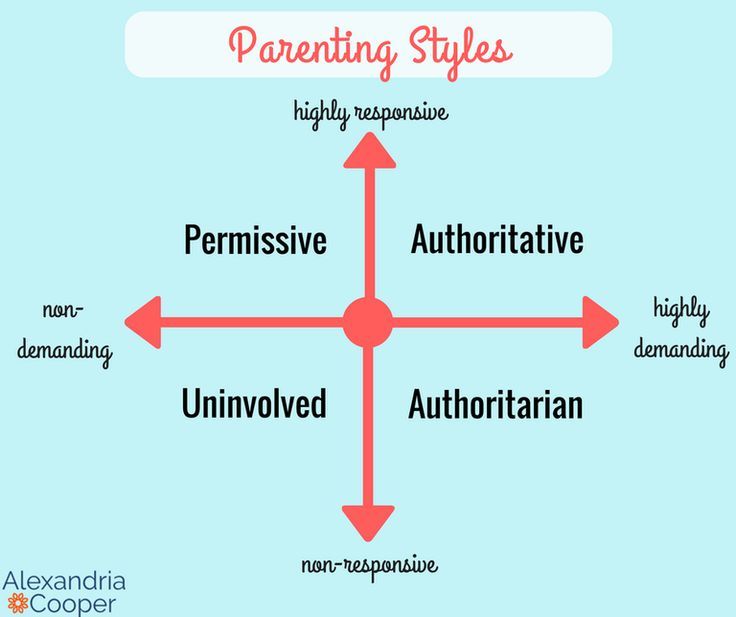 But authoritative parents are also good psychologists and problem-solvers. How do they talk with their kids? What tactics do they use to reason with children? How do they address their children’s emotional issues?
But authoritative parents are also good psychologists and problem-solvers. How do they talk with their kids? What tactics do they use to reason with children? How do they address their children’s emotional issues?
For help, see these evidence-based tips for implementing positive parenting practices.
But there isn’t any one, universally-accepted litmus test.
For example, the statements above might make it seem that you have to run your family like a mini-democracy in order to be authoritative. But that isn’t the case.
Or maybe you think that authoritative parenting sounds very strict. You might regard the statement about letting kids “get away with leaving chores unfinished” as evidence that authoritative parents must respond to every infraction by imposing a punishment.
Again, that’s not necessarily true.
As we’ll see below, the classic definition of authoritative parenting allows for variation in these areas. And different researchers have used different screening tools to decide who’s “authoritative.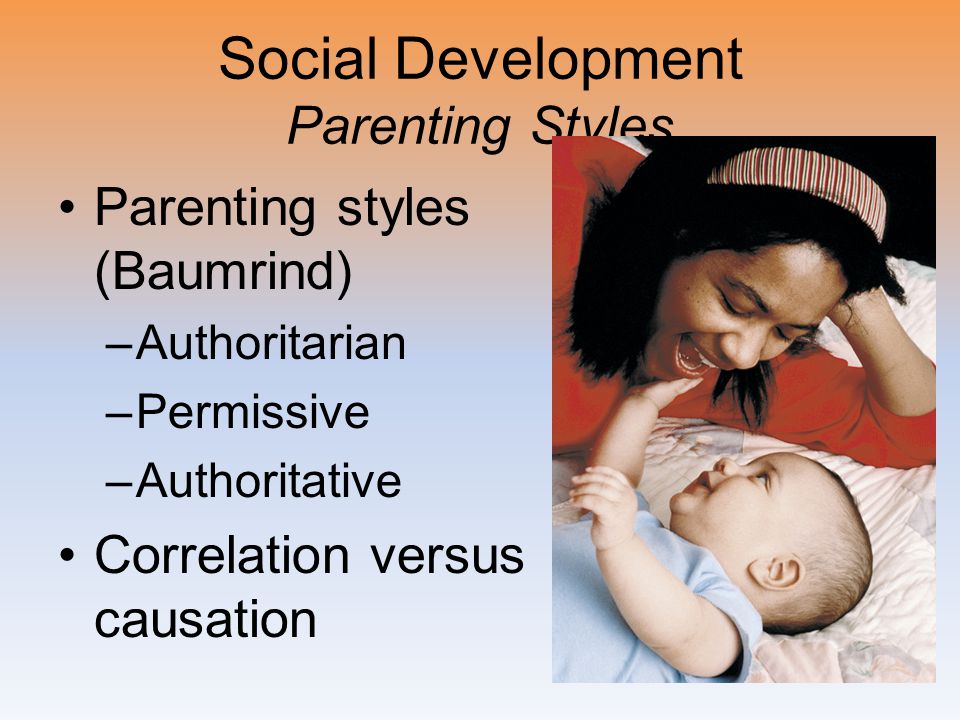 ”
”
For instance, researchers in Spain have reported that adolescents from permissive families are as well-behaved and academically successful as are teens from authoritative homes. The results contradict studies that link permissive parenting with inferior child outcomes. Could cultural differences account for the mixed results? Are some studies just wrong?
Maybe. But as I’ve argued elsewhere, it seems likely that the disagreement reflects differences in the wording of the questionnaires used to identify a parent’s style.
Alfonso Osario and his colleagues recently tested this idea, and found support for it. Once Spanish adolescents were evaluated with the same questionnaire used in the United States, authoritative care-giving was linked with the best child outcomes (Osario et al 2016).
Does authoritative parenting look the same in every family?
Not necessarily. For example, when researchers surveyed parents in four different countries — China, the United States, Russia, and Australia– they found an interesting pattern.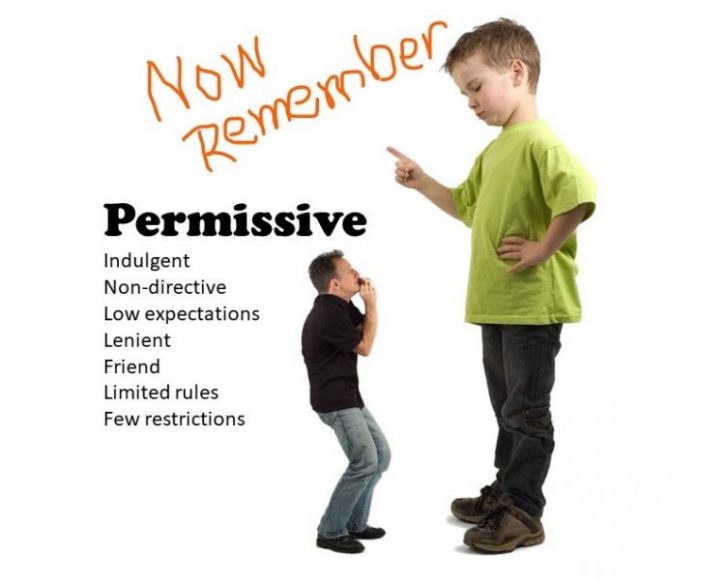
In the U.S. and Australia, authoritative parents were very likely to emphasize certain democratic practices, like taking a child’s preferences into account when making family plans, or encouraging a child to express his or her own opinions (Robinson et al 1997).
But in China and Russia, authoritative parents didn’t take their children’s preferences into account when making family plans. And most authoritative parents from China didn’t encourage kids to voice their own opinions — not if those opinions were in conflict with a parent’s views (Robinson et al 1996).
What, then, did authoritative parents have in common across all four countries?
One of the biggest common denominators concerned discipline.
Authoritative parents everywhere made it a point to reason with their children (Robinson et al 1997). When their children misbehaved, they talked with them, and explained the reasons for the rules. Let’s take a closer look.
How do authoritative parents discipline their kids?
It’s called “inductive discipline,” and there is evidence that it helps kids become more empathic, helpful, conscientious, and kind to others (Krevans and Gibbs 1996; Knafo and Plomin 2006).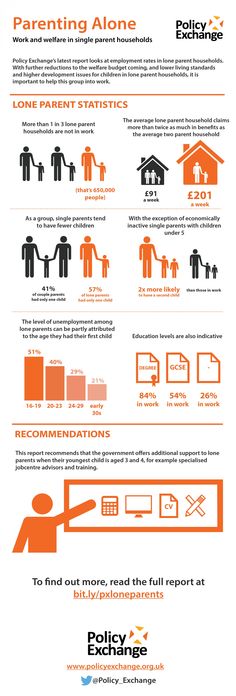
It may also help prevent children from developing aggressive or defiant behavior problems (Choe et al 2013; Arsenio and Ramos-Marcuse 2014).
And inductive discipline may promote the development of morality (Patrick and Gibbs 2016).
But what is it, really? Inductive discipline is about teaching your child to think — constructively and non-selfishly — about how their behavior affects others.
The idea is that instead of trying to enforce good behavior through threats and punishments, you provide kids with the internal tools to regulate themselves:
Shaping behavior through reasoning.
For a very young child, this might mean simply explaining why she can’t touch something. That’s not for you! It’s too hot! It could burn you! But for older kids, it means talking with them — not at them — about the reasons for our policies and rules.
Emotion coaching.
What should your child do when he feels angry? Or sad? Or scared? Inductive discipline depends on your child’s ability to cope with strong emotions, so one facet of inductive discipline is being a good “emotion coach. ” Read tips about that here.
” Read tips about that here.
Emphasizing empathy and concern for others.
Inductive discipline focuses on the consequences of a child’s behavior for others. What happens when you shove your brother? How does it make him feel?
The goal of inductive discipline is to nurture a child’s intrinsic motivation to cooperate and behave with kindness (Xiao et al 2018; Xiao 2016).
Studies show that even very young children feel empathy, and want to be helpful. So we can help kids develop moral reasoning skills by talking with them about how our behavior impacts others. For more information, see these tips for fostering empathy in children.
Why do kids from authoritative families turn out so well?
Each component of the authoritative parenting style seems to have its own benefits.
As noted above, inductive discipline—explaining the reasons for rules—has been linked with more advanced moral reasoning skills (Krevans and Gibb 1996; Kerr et al 2004).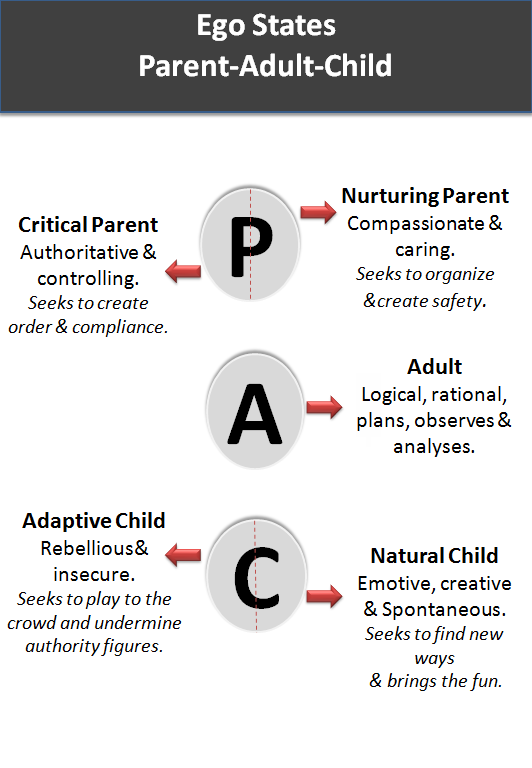
In addition, research suggests the following points.
1. Warm, responsive parenting promotes secure attachments, and protects kids from developing internalizing problems.
2. The children of authoritative parents are less likely than the children of authoritarian parents to engage in drug and alcohol use, juvenile delinquency, or other antisocial behavior (e.g., Lamborn et al 1991; Steinberg et al 1992; Querido et al 2002; Benchaya et al 2011; Luyckx et al 2011).
3. Talking with kids about thoughts and feelings may strengthen attachment relationships and make kids into better “mind readers.”
4. Parents who avoid reprimanding kids for intellectual mistakes (e.g., “I’m disappointed in you”) may have kids who are more resilient problem-solvers and better learners (Kamins and Dweck 1999; Schmittmann et al 2006; van Duijvenvoorde et al 2008).
5. Encouraging independence in kids is linked with more self-reliance, better problem solving, and improved emotional health (e.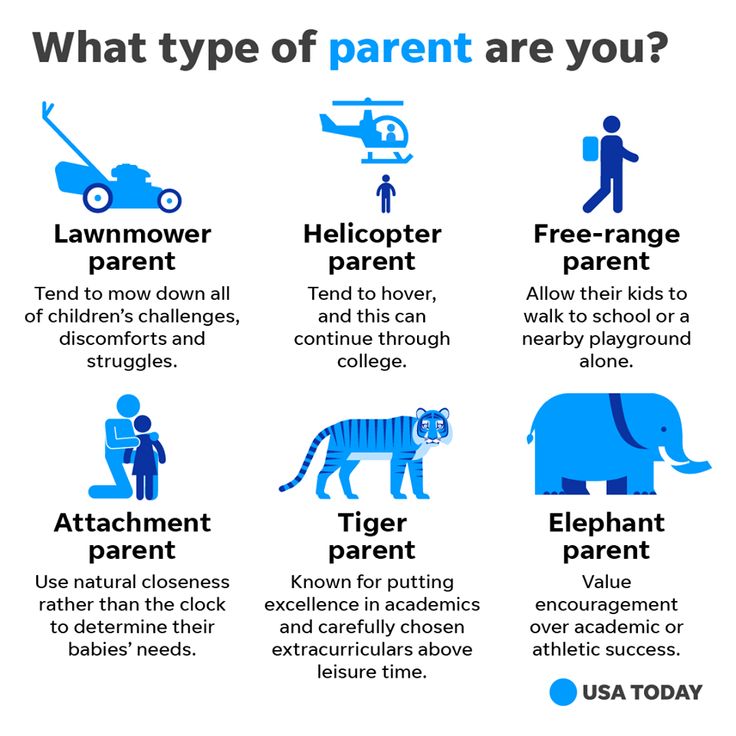 g., Turkel and Tezer 2008; Rothrauff et al 2009; Lamborn et al 1991; Pratt et al 1988; Kamins and Dweck 1999; Luyckx et al 2011).
g., Turkel and Tezer 2008; Rothrauff et al 2009; Lamborn et al 1991; Pratt et al 1988; Kamins and Dweck 1999; Luyckx et al 2011).
6. An authoritative approach to discipline may help prevent aggression and reduce peer problems in preschoolers (e.g., Choe et al 2013; Yamagata 2013).
7. Kids with warm, responsive parents are more likely to be helpful, kind, and popular.
The last point is illustrated by research conducted in the Netherlands. In this study, school kids were observed at home as they worked with their parents on a couple of puzzle tasks. Then researchers
- recorded how often parents uttered their disapproval or tried to take over the task,
- rated how often parents showed warmth, made suggestions, used induction (“What would happen if we tried this?”), or demanded mature behavior from their kids, and
- asked teachers and peers to rate each child’s social behavior.
The results are compelling.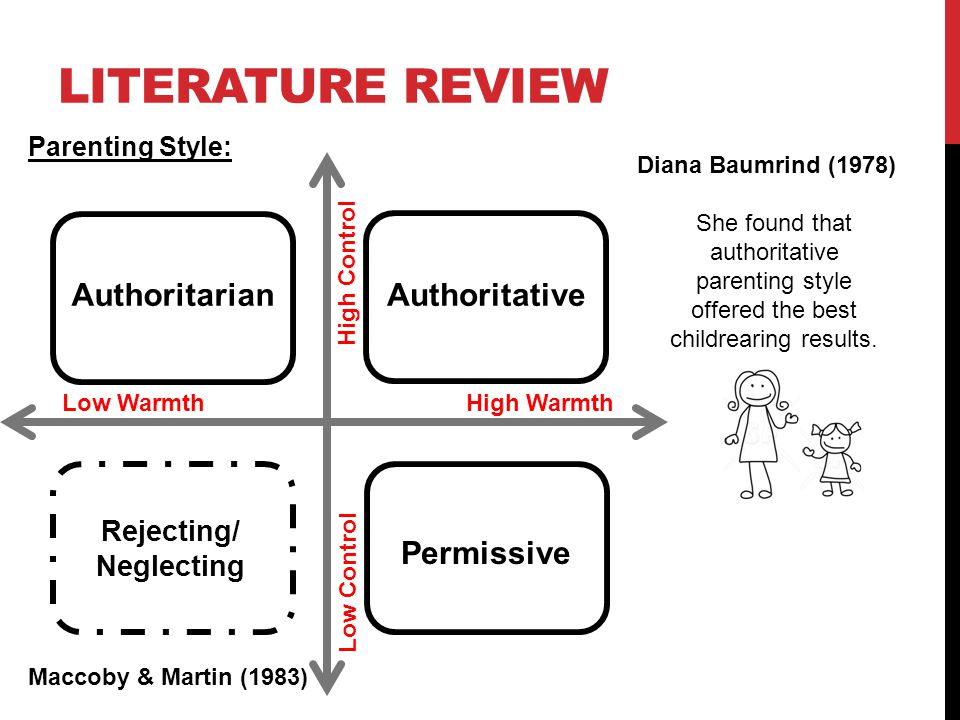 Parents who behaved more authoritatively during the puzzle task had kids who were rated as more prosocial—helpful and kind—by their teachers and peers. The kids with authoritative parents were also more popular (Dekovic and Janssens 1992).
Parents who behaved more authoritatively during the puzzle task had kids who were rated as more prosocial—helpful and kind—by their teachers and peers. The kids with authoritative parents were also more popular (Dekovic and Janssens 1992).
There is even evidence that kids from authoritative homes are more attuned with their parents and less influenced by their peers.
In a study of American students, undergraduates were presented with a series of moral problems and asked how they would solve them. Students from authoritative families were more likely than others to say that their parents–not their peers–would influence their decisions (Bednar and Fisher 2003).
But there are other factors, too.
It’s likely that the benefits of authoritative child-rearing are maximized when the whole community is organized along authoritative principles. For instance, when the school climate is authoritative, kids from authoritative families may find it easier to fit in (Pellerin 2004).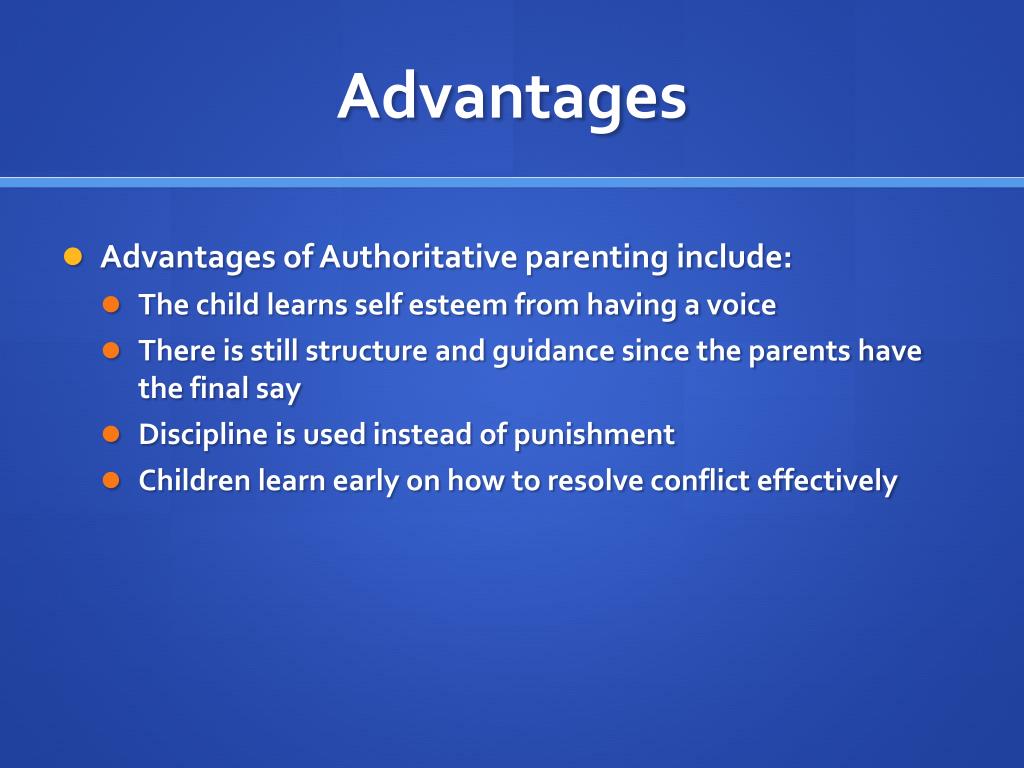
In addition, some studies have reported ethnic differences–that for African-American and Chinese-Americans, there is sometimes little or no difference in academic performance between kids from authoritarian and authoritative homes.
Why? Researchers have posed several different explanations, which you can read about in this article that contrasts the effects of authoritarian parenting with the effects of authoritative parenting.
Nevertheless, there is remarkable agreement across studies. From Argentina to China, from the United States to Pakistan, the authoritative parenting style is consistently associated with superior outcomes (Steinberg 2001).
As researcher Laurence Steinberg has stated, “I know of no study that indicates that adolescents fare better when they are reared with some other parenting style” (Steinberg 2001).
As of 2017, that still seems to be the case. In a recent analysis of 428 published studies, researchers compared child outcomes throughout the world.
For every region of the globe, they found that the authoritative parenting style was associated with at least one positive child outcome (Pinquart and Kauser 2017). By contrast, authoritarian parenting was linked with at least one negative child outcome (Pinquart and Kauser 2017). The authors conclude that the authoritative approach is worth recommending everywhere.
Looking for practical advice? See my evidence-based positive parenting techniques, as well as these tips for acting as your child’s “emotion coach.”
If you’re interested in reading more about how researchers identify parenting styles, check out this Parenting Science overview, which includes a discussion of Diane Baumrind’s original model.
For more information about the difference between authoritarianism and the authoritative parenting style, see my article, “Authoritarian parenting: What happens to the kids?”
And for help drawing the line between permissiveness and authoritative parenting, see this Parenting Science article about the permissive parenting style.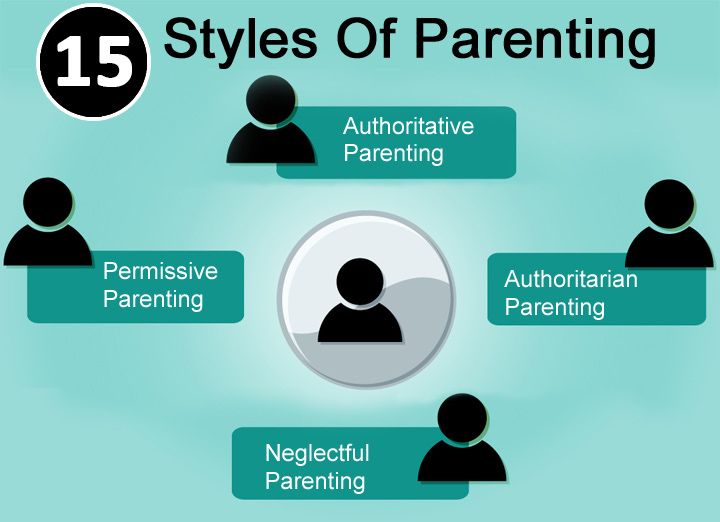
Interested in the research supporting responsive, sensitive parenting? See my article about the health benefits, as well as my overview of the science of attachment parenting.
In addition, read more about the importance of treating children as independent, thinking beings, and the possibility of friendship between parents and children.
References
Arsenio W and Ramos-Marcuse F. 2014. Children’s moral emotions, narratives, and aggression: relations with maternal discipline and support. J Genet Psychol. 175(5-6):528-46.
Baumrind D. 1966. Effects of authoritative parental control on child behavior. Child Development, 37(4), 887-907.
Baumrind D. 1991. The influence of parenting style on adolescent competence and substance use. Journal of Early Adolescence 11(1): 56-95.
Bednar DE and Fisher TD. 2003. Peer referencing in adolescent decision making as a function of perceived parenting style. Adolescence. 38(152):607-21.
Benchaya MC, Bisch NK, Moreira TC, Ferigolo M, and Barros HM.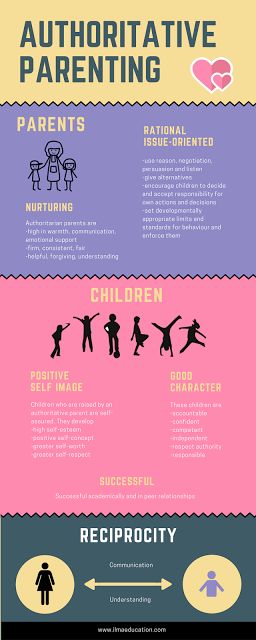 2011. Non-authoritative parents and impact on drug use: the perception of adolescent children. J Pediatr (Rio J). 87(3):238-44
2011. Non-authoritative parents and impact on drug use: the perception of adolescent children. J Pediatr (Rio J). 87(3):238-44
Chao R. 2001. Extending research on the consequences of parenting style for Chinese Americans and European Americans. Child Development 72: 1832-1843.
Choe DE, Olson SL, and Sameroff AJ. 2013. The interplay of externalizing problems and physical and inductive discipline during childhood. Dev Psychol. 49(11):2029-39.
Dekovic M and Janssens JM. 1992. Parents’ child: Rearing style and child’s sociometric status.” Developmental Psychology 28(5): 925-932.
Fletcher A, Steinberg L, and Sellers E. 1999. Adolescents’ well-being as a function of perceived inter-parent inconsistency. Journal of Marriage and the Family 61: 300-310.
Patrick RB and Gibbs JC. 2016. Maternal Acceptance: Its Contribution to Children’s Favorable Perceptions of Discipline and Moral Identity. J Genet Psychol. 177(3):73-84.
Kamins M and Dweck C. 1999. Person versus process praise and criticism:Implications for contingent self-worth and coping. Developmental Psychology 30(3): 835-847.
Person versus process praise and criticism:Implications for contingent self-worth and coping. Developmental Psychology 30(3): 835-847.
Kerr DC, Lopez NL, Olson SL, and Sameroff AJ. 2004. Parental Discipline and Externalizing Behavior Problems in Early Childhood: The Roles of Moral Regulation and Child Gender. J Abnorm Child Psychol. 32(4):369-83.
Knafo A and Plomin R. 2008. Prosocial behavior from early to middle childhood: genetic and environmental influences on stability and change. Developmental psychology 42(5):771-86.
Krevans J and Gibbs JC. 1996. Parents’ use of inductive discipline: relations to children’s empathy and prosocial behavior. Child Development, 67: 3263-77.
Lamborn SD, Mants NS, Steinberg L, and Dornbusch SM. 1991. Patterns of competence and adjustment among adolescents from authoritative, authoritarian, indulgent, and neglectful families. Child Development 62: 1049-1065.
Luyckx K, Tildesley EA, Soenens B, Andrews JA, Hampson SE, Peterson M, and Duriez B.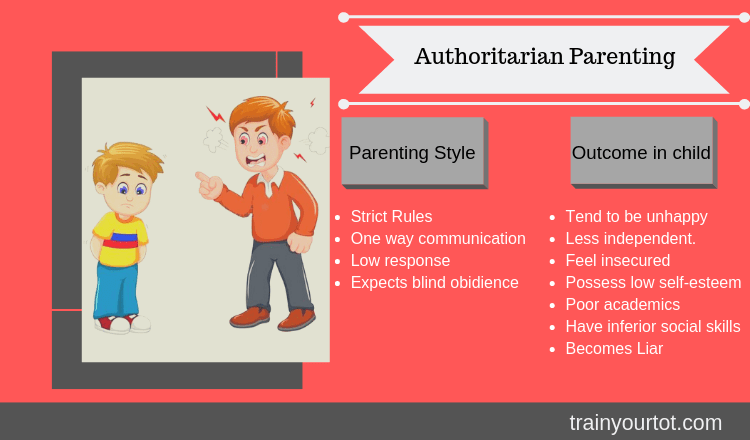 2011. Parenting and trajectories of children’s maladaptive behaviors: a 12-year prospective community study. J Clin Child Adolesc Psychol. 40(3):468-78.
2011. Parenting and trajectories of children’s maladaptive behaviors: a 12-year prospective community study. J Clin Child Adolesc Psychol. 40(3):468-78.
Maccoby EE and Martin JA. 1983. Socialization in the context of the family: Parent–child interaction. In P. H. Mussen (ed) and E. M. Hetherington (vol. ed.), Handbook of child psychology: Vol. 4. Socialization, personality, and social development (4th ed., pp. 1-101). New York: Wiley.
Osorio A and González-Cámara M. 2016. Testing the alleged superiority of the indulgent parenting style among Spanish adolescents. Psicothema. 28(4):414-420.
Pellerin LA. 2005. Applying Baumrind’s parenting typology to high schools: Toward a middle-range theory of authoritative socialization. Social Science Research 34: 283-303.
Pinquart M and Kauser R. 2017. Do the Associations of Parenting Styles With Behavior Problems and Academic Achievement Vary by Culture? Results From a Meta-Analysis. Cultur Divers Ethnic Minor Psychol.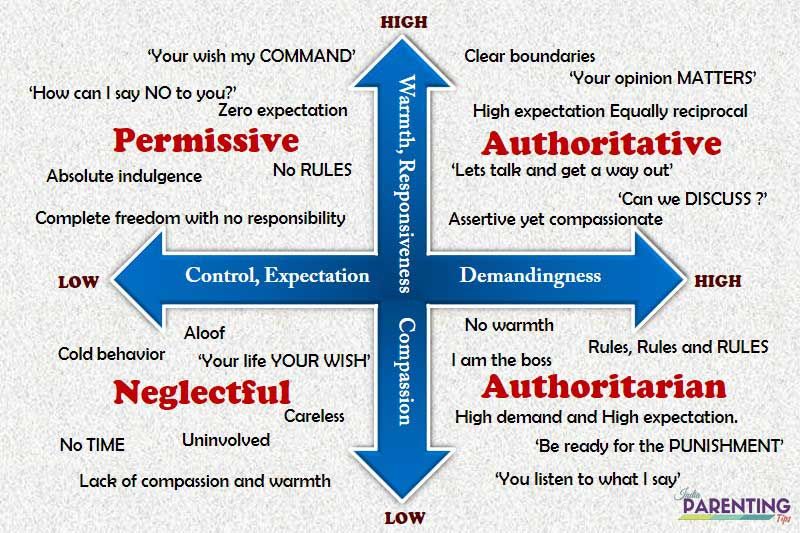 2017 Apr 10. doi: 10.1037/cdp0000149. [Epub ahead of print]
2017 Apr 10. doi: 10.1037/cdp0000149. [Epub ahead of print]
Pratt MW, Kerig P, Cowan PA, and Cowan CP. 1988. Mothers and fathers teaching 3-year-olds: Authoritative parenting and adult scaffolding of young children’s learning. Developmental Psychology. Vol 24(6): 832-839.
Querido JG, Warner TD, and Eyberg SM. 2002. Parenting Styles and Child Behavior in African American Families of Preschool Children Journal of Clinical Child & Adolescent Psychology, 31(2): 272 – 277.
Robinson CC, Mandleco BL, Olsen SF and Hart CH. 1995. Authoritative, authoritarian, and permissive parenting practices: Development of a new measure for parents of preschool-age children. Psychological Report77: 819-830.
Robinson CC, Hart CH, Mandleco BL, and Olsen SF. 1996. Psychometric support for a new measure of authoritative, authoritarian, and permissive parenting practices: Cross cultural connections. Paper presented in Symposium: New measures of parental child-rearing practices developed in different cultural contexts, XIVth Biennial International Society for the Study of Behavioral Development Conference, Quebec City, Canada, August 12-16, 1996.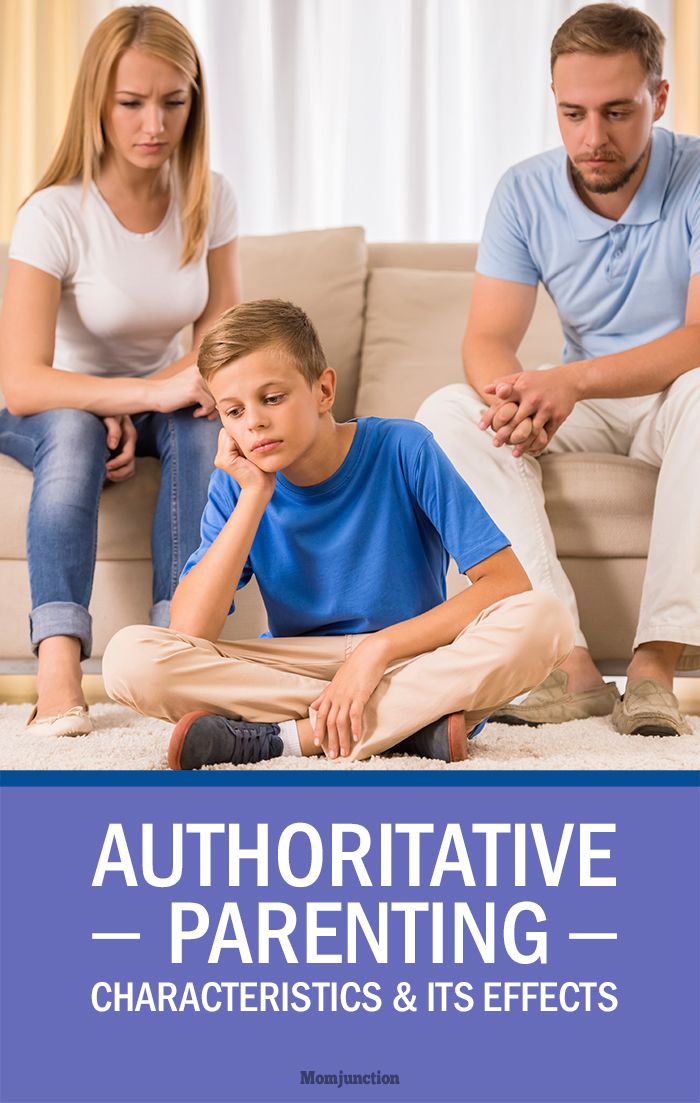
Rothrauff TC, Cooney TM, and An JS. 2009. Remembered parenting styles and adjustment in middle and late adulthood. J Gerontol B Psychol Sci Soc Sci. 64(1):137-46.
Steinberg L. 2001. We know some things: Parent-adolescent relationshgips in retrospect and prospect. Journal of research on adolescence 11(1): 1-19.
Türkel YD and Tezer E. 2008. Parenting styles and learned resourcefulness of Turkish adolescents. Adolescence. 43(169):143-52.
Xiao SX. 2016. Inductive Discipline and Children’s Prosocial Behavior: the Role of Parental Emotion Regulation Strategies. Dissertations ALL. Paper 507.
Xiao SX, Spinrad TL, Carter DB. 2018. Parental emotion regulation and preschoolers’ prosocial behavior: The mediating roles of parental warmth and inductive discipline. J Genet Psychol. 9:1-10
Yamagata S, Takahashi Y, Ozaki K, Fujisawa KK, Nonaka K, and Ando J. 2013. Bidirectional influences between maternal parenting and children’s peer problems: a longitudinal monozygotic twin difference study. Dev Sci. 16(2):249-59.
Dev Sci. 16(2):249-59.
This article is based on research published through July 2017. Content last modified 7/17.
image of mother talking to girl near bicycle by Dishant_S / istock
image of father and son / istock
What is Authoritative Parenting? Definition and Benefits
If you read headlines, it would seem that most parenting styles are ones to avoid. You don’t want to be a helicopter parent. Or a lawnmower parent. But really, most of us are just trying to be good parents, right? So what’s the style for that?
Everyone has their opinion. Yet, studies seem to agree that an authoritative style tends to work best for children. Let’s look at what authoritative parenting involves, and how it differs from other parenting styles.
Authoritative parenting is one of four parenting styles based on the research and work of developmental psychologist Diana Baumrind:
- authoritarian
- authoritative
- permissive
- uninvolved
These styles are defined by how parents:
- express love
- deal with their child’s needs and desires
- exercise their authority over their children
In the case of authoritative parenting, there’s a healthy balance between the two.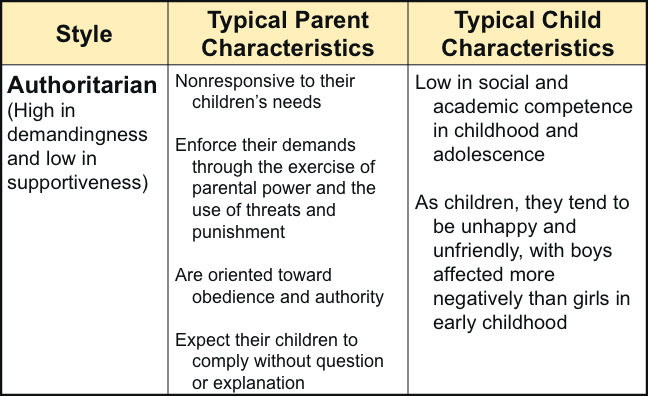
Authoritative parents give their children a lot of support and love. They are flexible and welcome open communication, but discipline isn’t put on the back burner.
They set clear guidelines and expect their kids to behave and listen to house rules. At the same time, they’re not overly strict or unreasonable.
Compared to other parenting styles, authoritative parenting appears to have the most positive effect on children.
Permissive parenting shares some similarities with authoritative parenting. These parents also nurture and have a strong attachment to their children. The difference is that permissive parents don’t set clear rules. They aren’t consistent with discipline. There’s a lot of leniency, and their children often test limits.
Authoritarian parents take a “no-nonsense” approach. These parents also set and enforce rules like authoritative parents. But they’re more strict, demanding, and critical. Also, they can have unreasonable expectations for their kids.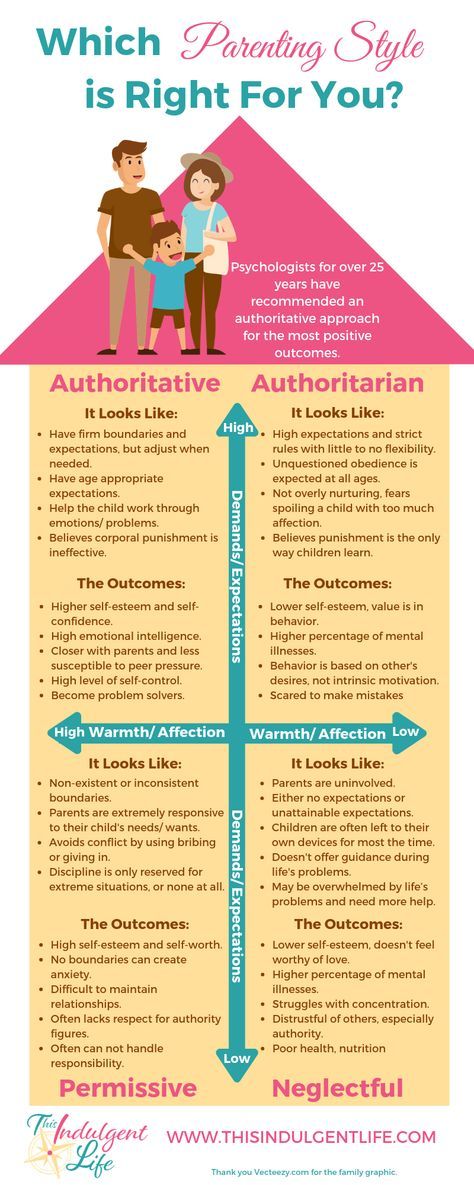
Uninvolved parenting is the complete opposite of authoritative parenting. With this style, parents are completely disengaged from their kids. There are no expectations, responsiveness, or rules. And they lack any type of emotional attachment.
To be clear, authoritative parenting isn’t the same across the board. Every kid is different. So even in the same household, it can look different based on the child.
Let’s say you have a toddler that doesn’t want to eat their dinner. A permissive parent might respond by making a different meal for the child. An authoritarian parent might respond by demanding that they sit at the table until their plate is clean. An authoritative parent might use this opportunity to discuss their refusal but explain that now is the time to eat.
Authoritative parents are flexible, so they might not require a clean plate. But they might expect the child to eat what is being served now if they are hungry, with the understanding that different food won’t be available until the next meal or snack time.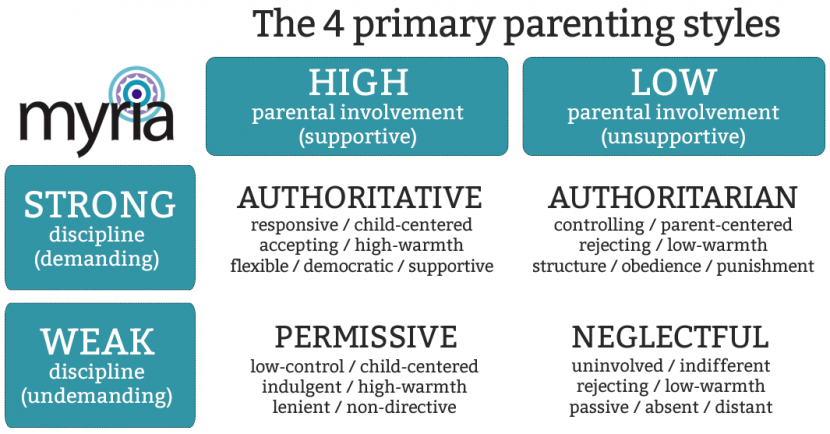 They’ll enforce this, even if the child whines or throws tantrums.
They’ll enforce this, even if the child whines or throws tantrums.
Here’s another example. An older child may want to play outside before finishing their chores. A permissive parent may allow the child to skip chores in favor of an early playtime. Meanwhile, an authoritarian parent, may yell, become upset, or threaten punishment if the child doesn’t finish their chores.
An authoritative parent takes a different approach. They don’t give in or react negatively. They stay calm, understanding why the child wants to play instead of doing chores. Their expectations for the child don’t waver, though.
The child still needs to finish their chores before playtime. But because these parents want their kids to learn responsibility, they might offer tips to help them finish faster. This way, they can get to playtime sooner.
Authoritative parenting changes from family to family, and even from child to child. Remember, this parenting style is about striking a healthy balance. These parents are nurturers, sensitive, and supportive, yet firm.
These parents are nurturers, sensitive, and supportive, yet firm.
The main benefit is that children may be more likely to develop a strong emotional bond to their parents. They also tend to be happier. Other benefits include:
Secure attachment
Authoritative parents are nurturers and listeners. They create a space where a child feels safe and secure. This type of relationship is known as secure attachment.
According to a small 2012 study evaluating how parenting styles affect intimate relationships, secure attachment results in healthier relationships. These children also have higher self-esteem, more self-confidence, and are friendlier.
Better coping skills
Everyone deals with anger, frustration, and sadness at some point. Yet, we also learn how to deal with these emotions to control our behavior and feelings.
Emotional regulation is something that’s learned. According to additional research, children of authoritative parents have stronger emotional regulatory skills.
This is likely due to these parents encouraging, but also guiding, their children to problem-solve when stressful situations arise. They teach at an early age how to cope rather than removing obstacles for them. And because of their ability to self-regulate and cope, these children tend to be better problem solvers.
Higher academic performance
Authoritative parents are invested in and supportive of their child’s schooling. These parents keep a close eye on their child’s grades and homework.
When it’s possible they’re present at school events and meetings. Their expectations for home and in school are consistent but reasonable and age-appropriate.
One 2015 study of 290 people found that college grade point averages were moderately higher in those with “high authoritative” parents than with “low authoritative” parents.
Good behavior
Authoritative parents aren’t strict disciplinarians like authoritarian parents. But they do set boundaries for their children and they will provide appropriate consequences for not following rules.
As a result, their children tend to be more cooperative and may exhibit better behavior than children raised by permissive or authoritarian parents.
Open-minded
These parents are adaptable and willing to provide explanations. They help their children understand the reasoning behind certain rules.
This type of openness and discussion helps their child develop good communication and social skills. They may also become more flexible and open-minded with others.
Many studies on authoritative parenting conclude that it’s likely the most effective method with the best outcome. However, it falls in the middle of authoritarian and permissive parenting. So it’s possible to slide over to one of these styles.
A parent may continue to support and nurture their child but become more lenient with rules, expectations, and requirements over time. Rather than staying consistent, they may give in when their child whines or throws tantrums.
Or, a parent may become more rigid and inflexible with rules and decisions. They could show less concern for their child’s feelings on certain matters. Instead of discussing they dictate.
A switch to either side can impact a child. Permissive parenting can lead to more rebelliousness and poor impulse control. Authoritarian parenting can lead to a higher risk of low self-esteem, mental health issues, and poor social skills.
To avoid a shift, here are different ways to use authoritative parenting:
- Set clear limits, reasonable expectations, and boundaries.
- Be consistent when enforcing reasonable consequences.
- Listen to your child’s perspective on matters.
- Offer explanations to help your child understand rules or limitations.
- Encourage independence.
- Be flexible and adaptable.
- Respect your child as a person.
- Don’t always come to the rescue, but rather allow them to fix problems.
Raising children who are responsible, happy, and cooperative involves support and nurturing. There must also be consequences for negative behavior. Authoritative parenting might not be a perfect parenting style, but it’s a parenting style that many experts believe in.
Authoritative parenting might not be a perfect parenting style, but it’s a parenting style that many experts believe in.
Parental authority
Consultation for parents
How to form parental authority.
The word "authority" in Latin means "power", "influence". But the concept of parental authority is much broader. In fact, the presence of authority proves the respect of children for their parents. Parental authority is the importance for children of the words, comments and requests of adults.
Authority, limits, and demands
By accepting adult leadership, any child tests the boundaries set by parents. Authority is precisely the recognition of these boundaries.
It is worth paying attention to several characteristic signs of “violated boundaries” in parent-child relationships:
- the child sleeps with the parent (most often with the mother) in the same bed;
- the child enters the parent's room without knocking;
- the child unceremoniously intervenes in adult conversations, demanding attention;
- the child ignores the remarks of the mother or father;
- the child gets angry or throws a tantrum if he doesn't get what he wants.
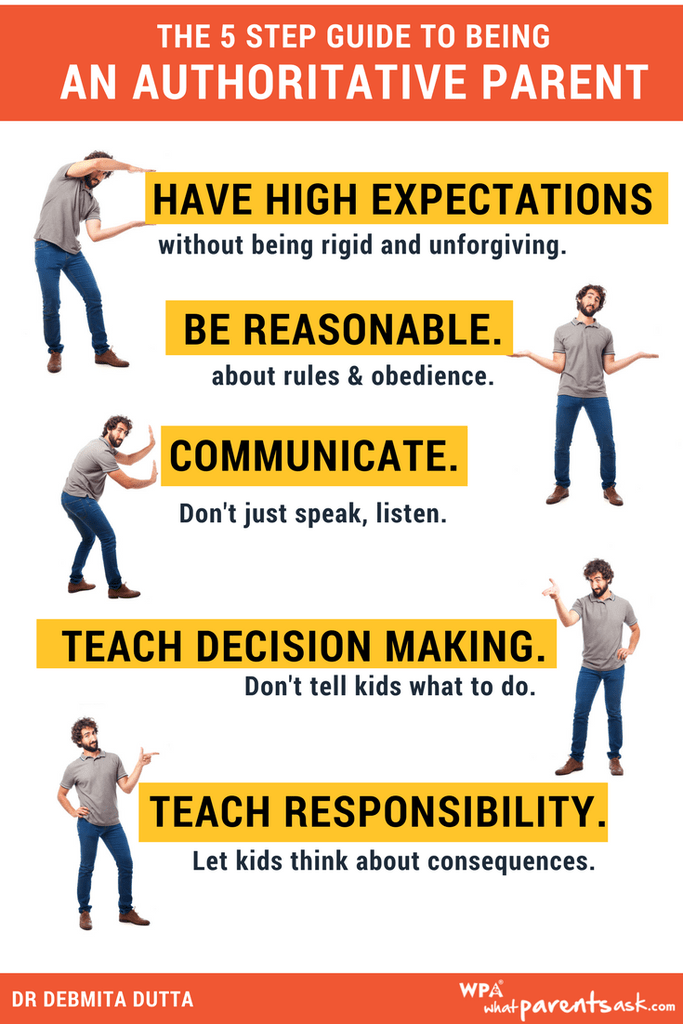
Communication with the child of a responsible parent implies care, exactingness and respect at the same time.
The following requirements work to increase the authority of parents:
- children must know the rules of communication with elders and adhere to them; 90,018 children must be taught to fulfill the requirements of their mother and father;
- when trying to violate the established rules, parents need to be firm.
There are different kinds of authority. You should be aware of the existence of certain types of false authority.
Types of “false authority” according to Makarenko
Makarenko singled out several types of so-called false authority, that is, those methods by which a parent tries to achieve obedience.
Among them, suppression authority. The authority of weaklings is usually used by people far from the culture, when the parent is so insecure that he believes that he should scold, punish, bend into a ram's horn, take it with an iron fist, keep in fear and obedience.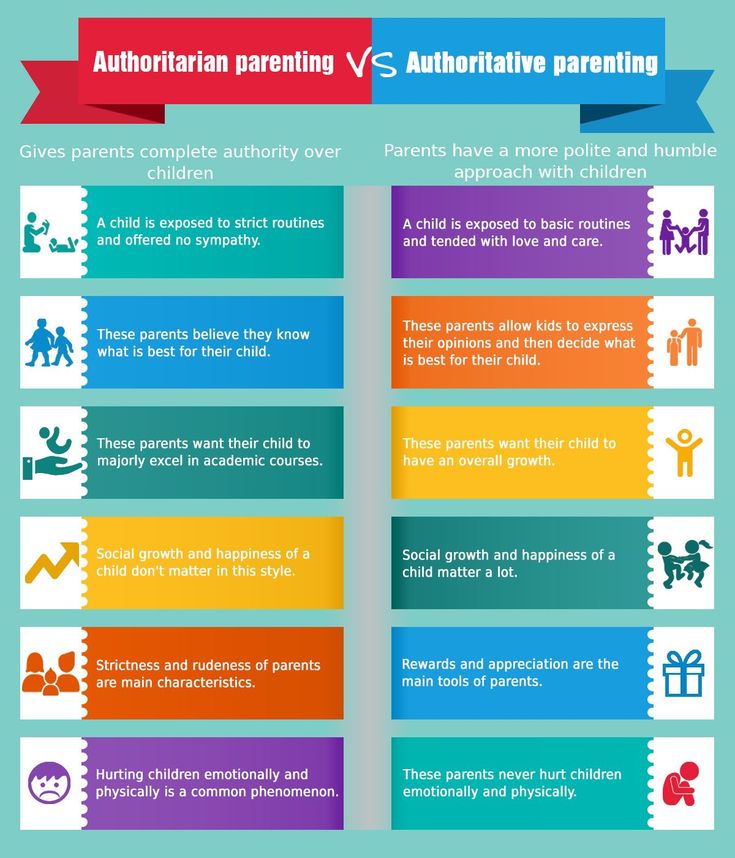 This is not authority, but authoritarianism.
This is not authority, but authoritarianism.
Similar to it is the authority of pedantry , when parents believe that everything they say should be perceived by children as an already adopted law - without discussion or objection.
The authority of reasoning - meaningless and merciless - lies in sanctimonious virtue, endless lectures and tedious edifications. It is blown out of children's ears, before it has time to settle, with a fresh wind of living life experience, passionate impulses, games and pranks.
Some parents practice distance authority : they believe that children should obey them only on the basis that they are father and mother, while they do not take part in their upbringing and keep their distance, most often entrusting children to their grandmother. In this case, parents do not seek to talk with children, do not help solve children's problems, but live their own lives.
With the authority of swagger , parents consider themselves the most intelligent, important and necessary and demonstrate their exclusivity at every step: they talk about their importance and treat people arrogantly.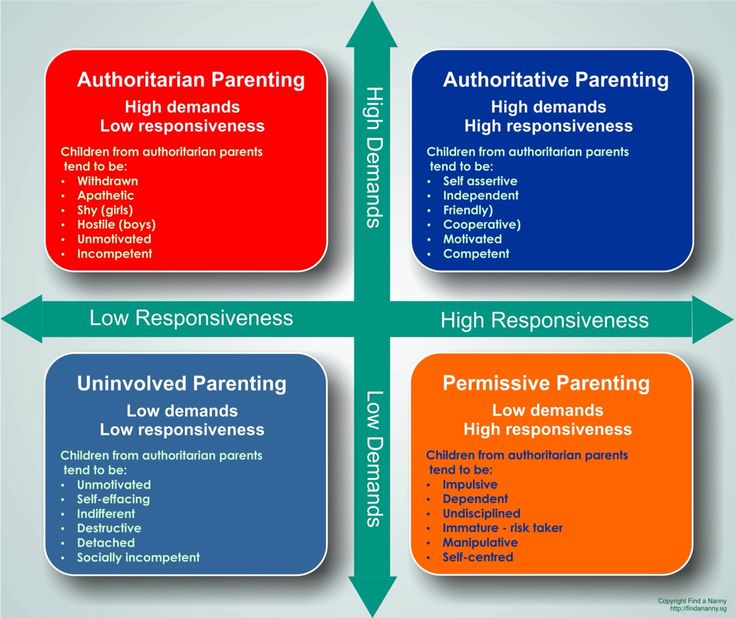
The authority of love is endless lisping and indulgence, when pouting is perceived as a catastrophe, and, in turn, the child must obey, because "because he loves mommy." So he learns to be a calculating manipulator, selfish and a liar.
Similar to him is the authority of kindness , when parents allow everything and endlessly pat on the head, despite the “quirks” of an increasingly impudent child.
Not far gone and authority of bribery when obedience is achieved through gifts and promises.
Well, friendship authority , which is used by parents who are not ready to take on the responsibility of being in charge. There is no question of any friendship here, because familiarity destroys authority.
Do not throw ashes on your head to those parents who sometimes get confused in concepts and allow forbidden tricks of false authority: while working on mistakes, one should strive to develop healthy parental authority.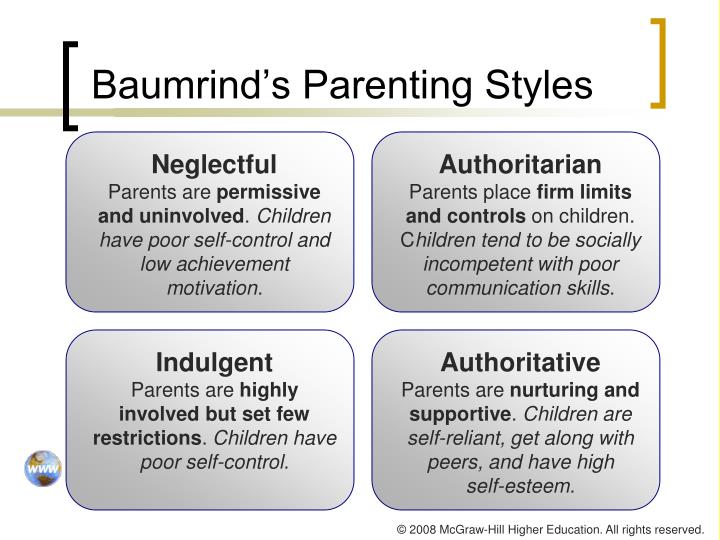
Formation of parental authority
Three main points underlie parental authority.
Parents realize that they are responsible adults
This means that adults do not argue with children. A dialogue is required, but not an argument.
Parents are not offended by children: offended, adults return to their childish state and cannot act according to their position and age.
Parents consider and understand the needs of the child
Parents are aware of what the child needs. This is not an indulgence of all “I want / I don’t want”, but “we need to do this because ...”, “this is necessary in order to ...”.
There are two possible strategies for understanding children: either remember yourself at that age and feel the situation, or imagine yourself as an adult in a similar situation.
Parents try to accept their child as he is
Not everything about children suits parents.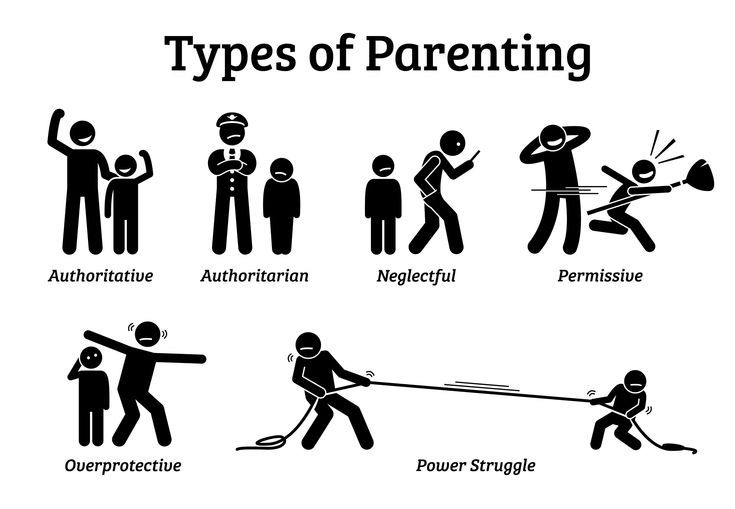 Children, on the other hand, love us for who we are - with all the flaws and virtues. Therefore, we must tell our son or daughter that we are not satisfied with their behavior, forbid something, but not be disappointed and always believe in them.
Children, on the other hand, love us for who we are - with all the flaws and virtues. Therefore, we must tell our son or daughter that we are not satisfied with their behavior, forbid something, but not be disappointed and always believe in them.
And again: start with yourself!
An authoritative parent is an adult who knows how to demand. But to demand not only from the child, but also from yourself.
For a child, parents are the most powerful, courageous, knowledgeable, wise people. his moral ideal. What is there! They are just perfect. Therefore, it will have to at least correspond to this. That is, educate yourself, and the children will catch up. It is difficult to convince a child not to scream when you yourself are constantly screaming. Any double standards are read by children at a time.
Authoritative adults are people who cannot be ignored and respected: they are people with great spiritual, moral and practical potential. Trying to become like this for your children is a parental task.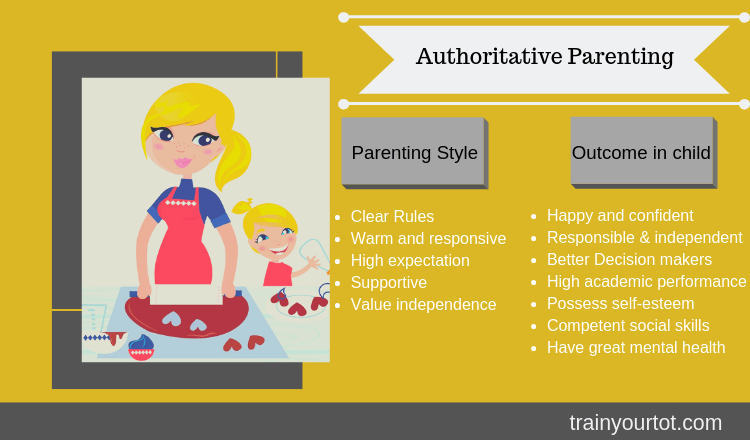
The parent may make mistakes, but must be able to admit them. Can solve a problem, including a child's problem. Can protect the child if necessary and stop him if he is wrong. He does not refuse support and love, does not indulge whims and remains principled. Sets rigid boundaries, the space within which is free.
Parental authority can only come from an adult who takes responsibility for himself, his life, his family and his children. An adult who you want to turn to if you don’t know what to do, and if you know, to share the result, being sure of sincere participation, empathy, honesty, fairness and mutual respect.
Material provided by educational psychologist Ivanova IV
157 total views, 1 views today
Site map - Official Portal of the Republic of Tyva
- Visually impaired version
- Sitemap
- Search
|















